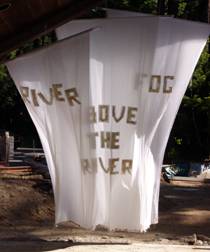Jane Reichhold is an internationally recognized and award-winning artist and poet, prolific writer, editor, publisher, and scholar based in Gualala, California. Jane has written thousands of poems and published nearly 35 books on haiku, tanka, and renga, including Basho: The Complete Haiku (2008); Ten Years Haikujane (2008); and Writing and Enjoying Haiku: A Hands on Guide (2002). Jane is a co-editor of LYNX, the publisher of AHA Books, and editor of AHA! POETRY where she keeps the practice of writing successful haiku and other Japanese poetry forms alive and lively.

Whirligig: You spent over twenty years working on Basho: The Complete Haiku. What compelled you to create this book? Can you talk about your motivations and processes?
Jane: I felt that if I could really see how Basho wrote his hokku, by seeing each word he used and not some translator’s idea of what a haiku could be in English, I could figure out how to write a better haiku. I started first by collecting every translation of each of his poems and comparing them. Then I asked Japanese friends to give me a word-for-word translation. I began to study Japanese but still depended on Japanese translators. My only contribution was to understand how Japanese poetry works and to make the translations fit or follow these precepts.
Whirligig: That’s a very humble response for twenty years of work which resulted in invaluable insights for both Basho and haiku scholars and enthusiasts.
Jane: Truth, like haiku, is so simple.
Whirligig: What initially drew you to haiku?
Jane: On the sale table at City Lights Books Store in San Francisco, in 1968, I found a Peter Pauper book of translations for a quarter. Though I had been writing poetry since college, I felt that here in the Japanese poems was a new way of expressing poetry. Soon afterwards I was making a vessel on a potter’s wheel and just as I pulled the clay upward a bird sang out. I had the feeling that it was the bird’s voice that caused the clay to rise. I realized that in this coincidence what I felt was the same kind of inspiration Japanese poets valued.
